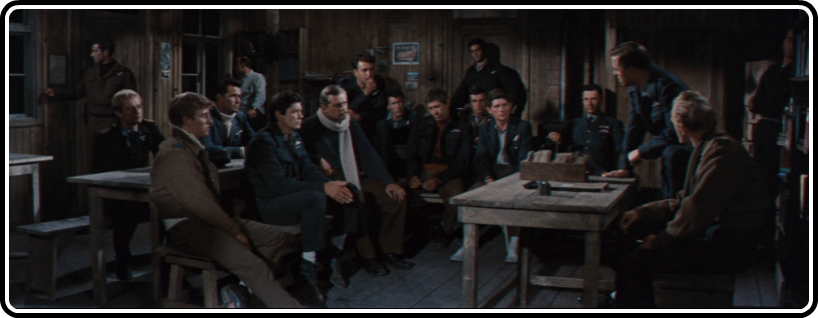
I spent this past Memorial Day weekend getting all my papers in order, because, contrary to what I am about to tell you, I am in fact an American male – this was the first time I’d seen The Great Escape. Perhaps it has something to do with a generation shift, that guys like my dad, who was born at the tail end of the baby boom and was a major give-peace-a-chance hippie, was perhaps less likely to sit me down as a child for a three-hour movie about American and British prisoners of war, but whatever the case, here we are. All for the best, perhaps, because I doubt my Star-Wars–and-Batman-obsessed ass would’ve much appreciated a film that takes place entirely in one location for two-thirds of its long, long runtime, but as a twenty-something cinephile who likes a little patience in his storytelling now and then, I found The Great Escape to be a blast. Sort of the polar opposite of Bresson’s A Man Escaped, it is a group effort, just as methodical but infinitely more indulged.
Based on a real escape plot on which a group of POWs embarked from a Nazi camp in 1944, director John Sturges, along with screenwriters James Clavell and W.R. Burnett, condensed, recast, and slightly embellished his otherwise-faithful recreation of the attempt to extradite two hundred and twenty men. In reality, Americans only assisted what was largely a British endeavor, though their roles are unsurprisingly amplified here, and Canadians get the short stick for not the first time, having comprised a quarter of the staff preparing for the escape, but are totally unrepresented here. Though the film is posited as something of a star vehicle for Steve McQueen these days (the image of him jumping a motorcycle over the fence, a feat accomplished by a stunt double in the film, graces the cover of this Blu-ray release), The Great Escape is much more of an ensemble affair, with James Garner, Richard Attenborough, Charles Bronson, Donald Pleasance, and James Coburn all having relatively equal thematic and emotional arcs.
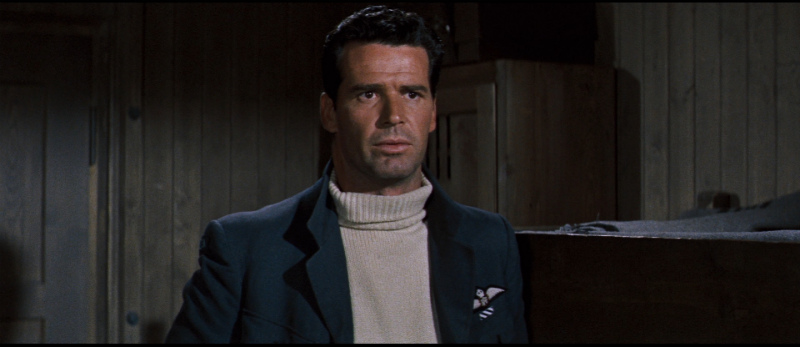
More than anything, of course, suspense drives the narrative, and Sturges really has to be commended for drawing so much out of so relatively little. Where, I’d say, he misses a step a little bit is in conveying really any great sense of dread that comes with remaining in the camp. I’m not expert on German POW camps circa World War II, but, as some information conveyed in the special features indicate, it seemed to be a much more grueling experience than the vibe conveyed via the film, in which the prisoners are allowed to make alcohol, celebrate the fourth of July, take classes, play games, plant gardens, and generally coexist in peace so long as they don’t upset the status quo. And this is where the issue of context becomes important, because a 1963 audience would have have a much better concept of what these camps were like, either by being a prisoner themselves or hearing about it from their husband, father, friend, uncle, whatever. Fifty years later, some of that context gets lost, but I will absolutely admit that some of that is on me; the rest could just as easily be the good ol’ production code, which still had a hold on the industry at the time.
Nevertheless, Sturges does manage to convey the importance of escape through the performances of his cast, and that’s where it really counts. His cinema takes care of the necessary tension, and, combined, wow look ma, it’s cinema. MGM and 20th Century Fox brings this landmark achievement to Blu-ray in what can only be described as “extremely compromised.” I’d been seeing mixed notices for, first, the digital restoration that played at the TCM Classic Film Festival this past April, and then again for the Blu-ray release. For the first fifteen or twenty minutes, I thought, “okay, the colors maybe aren’t terribly bold, but it seems to fit the atmosphere of the picture,” and then trouble starts coming. There are still vast sections of the film that look gorgeous – crisp, nicely textured, exhibiting a decent sense of depth, and by the time (spoiler alert?) the men do start to get outside of the prison, the color really does start to let loose. But so many other parts are completely washed out, unfocused, hazy, at all-around looking like an upconverted DVD transfer. On the whole, I was pretty disappointed. [Screencaps are courtesy of DVD Beaver]
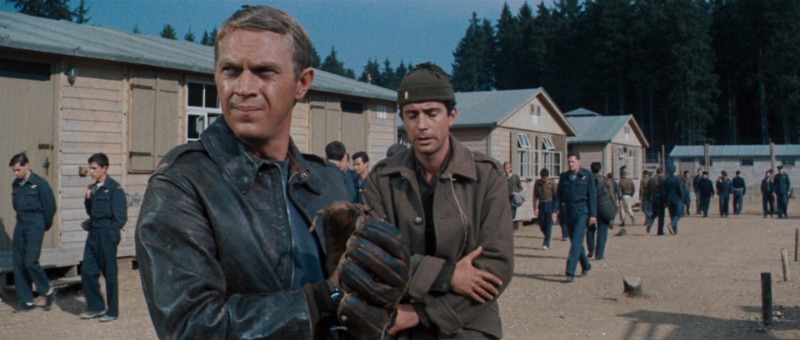
The main extra feature on the disc is the commentary track, which is lead by Steven Jay Rubin, who directed a documentary called “Return to the Great Escape,” which itself is also included on this disc. While he interjects with some scene-specific comments, he serves as a sort of presenter for a series of interviews he had conducted over the years with Sturges; Coburn; Garner; Pleasance; David McCallum; Jud Taylor; Sturges’ former assistant, Robert Relyea; Bud Ekins, the stuntman who performed the motorcycle jump; art director Fernando Carrere; and McQueen’s former manager, Hilly Elkins.
Supplementing that are a round of featurettes, starting off with a series of short documentaries produced for the History Channel, and narrated by Burt Reynolds – “Bringing Fact to Fiction,” “Preparations for Freedom,” “The Flight to Freedom,” and “A Standing Ovation.” The titles are pretty self-explanatory, but they examine the real escape attempt, the liberties the film took with the truth, and finally, the reception of the film itself, especially among those with firsthand knowledge of the incident. These are all presented in full frame, which is really a drag when they switch to letterboxed-widescreen clips of the film.
“The Great Escape – The Untold Story” uses a mixture of interviews and reenactments to tell the story of the Allied effort to bring to justice those who played a role in the deaths of the escaped prisoners, which the film makes no bones about claiming were outright murders. Additional interviews, cut from the documentary, are also included. The reenactment portions are so stale and robotic that, given the mixture of British television frame rates and the dead-eye performances, I thought at first this was a trailer for a video game, but otherwise, it’s all right. Presented in anamorphic widescreen.
“Return to the Great Escape” is the aforementioned documentary, though by this point, you’re going to be left, pretty much, with a lot of recycled material, though, since they use clips from full-frame, made-for-TV transfers of the film, it does provide a good avenue for appreciating the relative merits of the Blu-ray transfer. But, you know, this documentary was made twenty years ago, and times do change. Presented, naturally, in full frame.
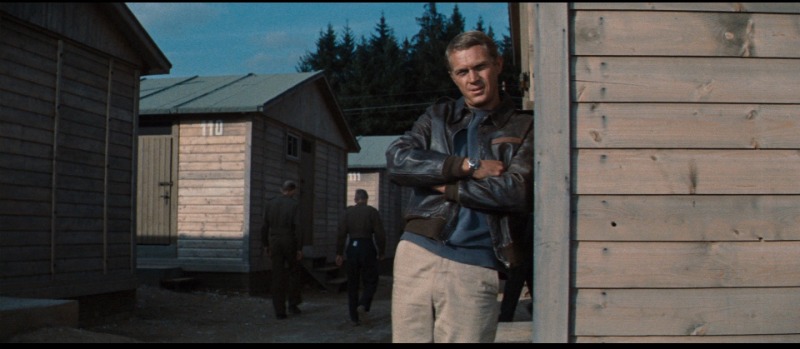
Finally, “The Real Virgil Hilts: A Man Called Jones” was probably my favorite of the non-commentary special features, as it gives us an interview with the man who was the inspiration for Steve McQueen’s character, and, as one might expect, quite a man in his own right. It charts his enlistment, quick rise in the Air Force, time spent in the POW camp, and long career in the military. Naturally, a good chunk goes over exactly what we see happen in the film, but his personal perspective really enlivens it, especially in mentioning some of the more dire aspects of being a POW.
Given the low price at which one can pick this up, the quality of the film, and a pretty good stack of special features, it’s probably still worth a purchase if you don’t own it already, but of course, that’s a decision to square with yourself. I hope MGM and Fox will revisit this at some point down the road, though the transfer is almost the very definition of “good enough.” It’s not as egregiously poor as the initial Patton release, nor as obviously different from its theatrical iteration as The French Connection, and MGM is proud enough of their work to be sending this around as a “new 4k restoration” to such venues as the TCM Classic Film Festival this past April, and, later this month, to the Aero Theatre in Santa Monica, so this will probably remain the standard bearer for a few years to come.


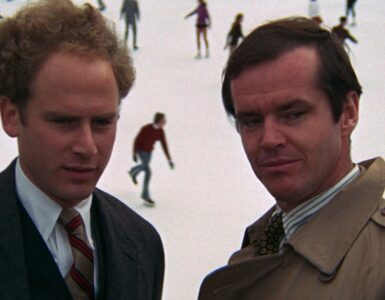

![Bergman Island (The Criterion Collection) [Blu-ray]](https://criterioncast.com/wp-content/uploads/2022/11/bergman-island-the-criterion-collection-blu-ray-400x496.jpg)
![This Is Not a Burial, It’s a Resurrection (The Criterion Collection) [Blu-ray]](https://criterioncast.com/wp-content/uploads/2022/11/this-is-not-a-burial-its-a-resurrection-the-criterion-collection-blu-ray-400x496.jpg)
![Lars von Trier's Europe Trilogy (The Criterion Collection) [The Element of Crime/Epidemic/Europa] [Blu-ray]](https://criterioncast.com/wp-content/uploads/2022/11/lars-von-triers-europe-trilogy-the-criterion-collection-the-element-of-400x496.jpg)
![Imitation of Life (The Criterion Collection) [Blu-ray]](https://criterioncast.com/wp-content/uploads/2022/11/imitation-of-life-the-criterion-collection-blu-ray-400x496.jpg)
![The Adventures of Baron Munchausen (The Criterion Collection) [4K UHD]](https://criterioncast.com/wp-content/uploads/2022/11/the-adventures-of-baron-munchausen-the-criterion-collection-4k-uhd-400x496.jpg)
![Cooley High [Criterion Collection] [Blu-ray] [1975]](https://criterioncast.com/wp-content/uploads/2022/11/cooley-high-criterion-collection-blu-ray-1975-400x496.jpg)